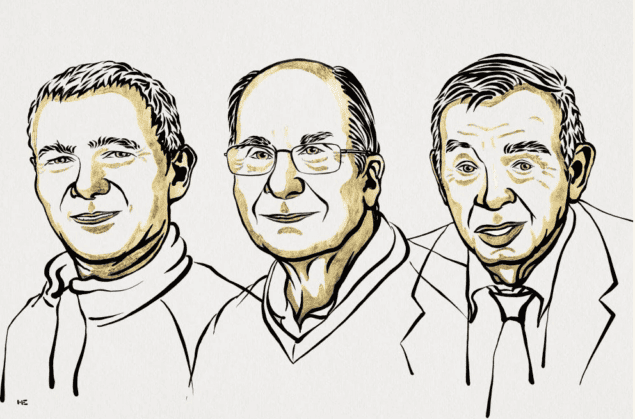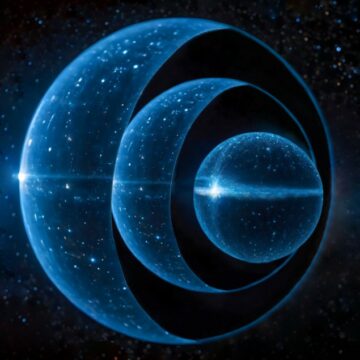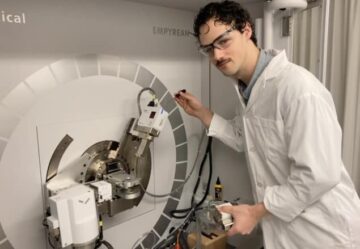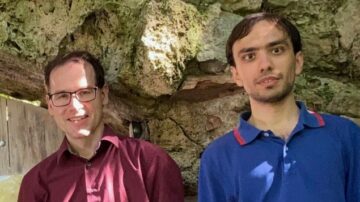
The Nobel Prize for Chemistry has been won by Moungi Bawendi, Louis Brus and Alexei Ekimov for “the discovery and synthesis of quantum dots”.
Quantum dots are extremely small particles just a few atoms in size and their properties allow them to emit light at specific wavelengths. Since the 1930s, physicists had long known that, in theory, quantum effects could arise in nanoparticles, but for decades it was difficult to recreate such materials.
That changed in the early 1980s, when Ekimov succeeded in creating size-dependent quantum effects in coloured glass. The colour came from nanoparticles of copper chloride and Ekimov demonstrated that the particle size affected the colour of the glass via quantum effects.
A few years later, Brus proved size-dependent quantum effects in particles floating freely in a fluid and in 1993 Bawendi revolutionised the production of quantum dots, resulting in almost perfect particles. This developed being necessary for them to be utilised in applications and they have since been used in computer monitors and television screens based on QLED technology.
From chemistry to physics
Bawendi was born in 1961 in Paris. He received his PhD from the University of Chicago in 1988 and is currently based at the Massachusetts Institute of Technology.
Brus was born in 1943 in the US. He did a PhD in chemical physics from Columbia University in 1969. He then went to the US Naval Research Laboratory before moving to AT&T Bell Labs in 1973 until 1996. He then took a position at Columbia Univeristy where he remained since.
Ekimov was born in 1945 in Russia. He received his PhD in physics in 1974 at the Ioffe Physical-Technical Institute, Russia. He then worked at the at the Vavilov State Optical Institute, Russia and since 1999 has been chief scientist at US-based Nanocrystals Technology Inc.
Bawendi spoke from the US during the press conference that followed the announcement of the award. He told Hans Ellegren “Don’t be sorry” for waking him up very early in the morning. Ellegren is Secretary General of the Royal Swedish Academy of Sciences and has the task of telephoning winners with the good news.
More to come.
- SEO Powered Content & PR Distribution. Get Amplified Today.
- PlatoData.Network Vertical Generative Ai. Empower Yourself. Access Here.
- PlatoAiStream. Web3 Intelligence. Knowledge Amplified. Access Here.
- PlatoESG. Carbon, CleanTech, Energy, Environment, Solar, Waste Management. Access Here.
- PlatoHealth. Biotech and Clinical Trials Intelligence. Access Here.
- Source: https://physicsworld.com/a/quantum-dot-pioneers-win-nobel-prize-for-chemistry/
- :has
- :is
- :where
- $UP
- 1973
- 1996
- 1999
- a
- Academy
- affected
- allow
- almost
- and
- Announcement
- applications
- ARE
- arise
- At
- AT&T
- award
- based
- BE
- been
- before
- being
- Bell
- born
- BRZ
- BSA
- BSC
- BSN
- BSP
- bst
- BSV
- BSW
- BSX
- but
- by
- came
- changed
- chemical
- chemistry
- chicago
- chief
- Columbia
- come
- computer
- Conference
- Copper
- could
- Creating
- Currently
- decades
- demonstrated
- developed
- DID
- difficult
- discovery
- DOT
- drawing
- during
- Early
- EC
- effects
- extremely
- few
- floating
- fluid
- followed
- For
- from
- General
- glass
- good
- had
- Have
- he
- him
- his
- HTTPS
- iii
- image
- in
- information
- Institute
- issue
- IT
- just
- known
- laboratory
- Labs
- later
- light
- Long
- massachusetts
- Massachusetts Institute of technology
- materials
- max-width
- MIT
- monitors
- morning
- moving
- necessary
- news
- nobel
- nobel prize
- of
- on
- optical
- outreach
- paris
- particle
- perfect
- phd
- Physics
- Physics World
- pioneers
- plato
- Plato Data Intelligence
- PlatoData
- position
- press
- prize
- Production
- properties
- proved
- Quantum
- Quantum dot
- Quantum dots
- received
- remained
- research
- resulting
- royal
- Russia
- s
- SCIENCES
- Scientist
- screens
- secretary
- since
- Size
- small
- specific
- State
- such
- Swedish
- T
- Task
- Technology
- television
- that
- The
- their
- Them
- then
- theory
- they
- this
- three
- thumbnail
- to
- told
- took
- true
- university
- University of Chicago
- until
- us
- used
- very
- via
- was
- wavelengths
- went
- when
- win
- winners
- with
- Won
- worked
- world
- year
- years
- zephyrnet












